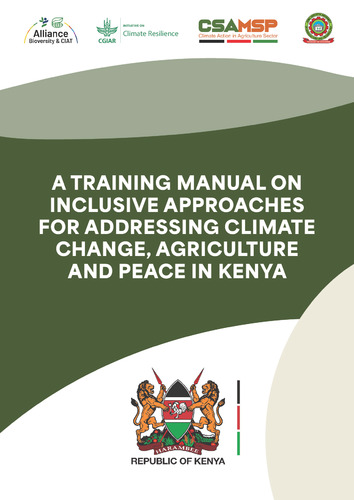A training manual on inclusive approaches to climate change, agriculture, and peace
Abstract
Climate change poses significant threats to Kenya’s agricultural sector, food security, and overall
peace. Climate stressors, such as heat, droughts, floods, and extreme weather events, have
a negative impact on agricultural productivity and livelihoods, with a potential to exacerbate
resource scarcity, and increase social tensions due to conflicts over land, water, and other
natural resources.
To tackle these interrelated challenges, it is essential for agricultural practitioners and policies
to integrate climate-smart and peace positive considerations. In light of this, the Ministry of
Agriculture and Livestock Development, in collaboration with the Climate-Smart Agriculture
Multi Stakeholder Platform (CSA MSP), and with the valuable support of Jomo Kenyatta
University of Agriculture and Technology, has partnered with the Alliance of Bioversity
International and CIAT (ABC) to create a training course on Inclusive Approaches to Climate
Change, Agriculture, and Peace. This initiative aims to enrich the understanding of how
agriculture can contribute to promotion of stability and peace within communities confronted by
the escalating climate crisis.
It is increasingly clear that climate-smart agriculture offers a holistic approach to transforming
agricultural systems and addressing the complex interplay between agriculture and climate
change. By fostering sustainable farming methods, connecting adaptation to mitigation
opportunities, and building resilience, climate-smart agricultural can play a significant role in
preventing and mitigating conflict risks. Consequently, integrating climate-smart agriculture
practices with peacebuilding and conflict-sensitive approaches can enhance food production
and stability, reduce the strain on natural resources, and prevent maladaptation.
This course illustrates the potential of CSA to contribute to peace through different climate,
peace, and security pathways. The climate, peace and security pathways are conceptualizations
that show how the impacts of climate change can directly or indirectly exacerbate conflict risks
and affect human security. Hence, by illustrating how CSA can positively contribute to each of
these pathways, this course emphasizes the potential of CSA as a tool for conflict prevention and
peace promotion.

